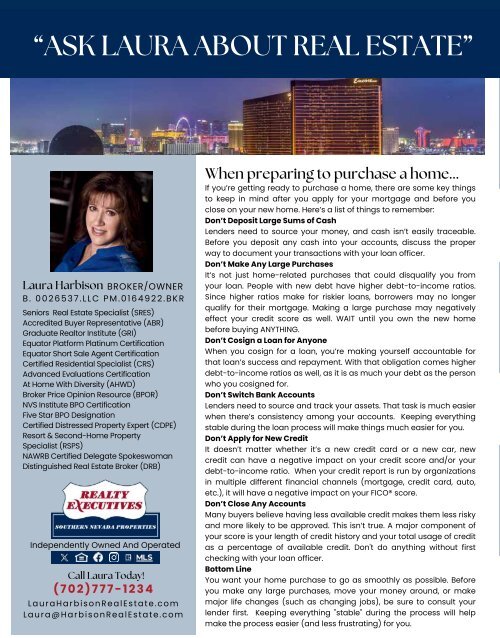You also want an ePaper? Increase the reach of your titles
YUMPU automatically turns print PDFs into web optimized ePapers that Google loves.
“ASK LAURA ABOUT REAL ESTATE”<br />
Laura Harbison BROKER/OWNER<br />
B. 0026537.LLC PM.0164922.BKR<br />
Seniors Real Estate Specialist (SRES)<br />
Accredited Buyer Representative (ABR)<br />
Graduate Realtor Institute (GRI)<br />
Equator Platform Platinum Certification<br />
Equator Short Sale Agent Certification<br />
Certified Residential Specialist (CRS)<br />
Advanced Evaluations Certification<br />
At Home With Diversity (AHWD)<br />
Broker Price Opinion Resource (BPOR)<br />
NVS Institute BPO Certification<br />
Five Star BPO Designation<br />
Certified Distressed Property Expert (CDPE)<br />
Resort & Second-Home Property<br />
Specialist (RSPS)<br />
NAWRB Certified Delegate Spokeswoman<br />
Distinguished Real Estate Broker (DRB)<br />
Independently Owned And Operated<br />
Call Laura Today!<br />
(702)777-1234<br />
LauraHarbisonRealEstate.com<br />
Laura@HarbisonRealEstate.com<br />
2<br />
February 2024<br />
When preparing to purchase a home...<br />
If you’re getting ready to purchase a home, there are some key things<br />
to keep in mind after you apply for your mortgage and before you<br />
close on your new home. Here’s a list of things to remember:<br />
Don’t Deposit Large Sums of Cash<br />
Lenders need to source your money, and cash isn’t easily traceable.<br />
Before you deposit any cash into your accounts, discuss the proper<br />
way to document your transactions with your loan officer.<br />
Don’t Make Any Large Purchases<br />
It’s not just home-related purchases that could disqualify you from<br />
your loan. People with new debt have higher debt-to-income ratios.<br />
Since higher ratios make for riskier loans, borrowers may no longer<br />
qualify for their mortgage. Making a large purchase may negatively<br />
effect your credit score as well. WAIT until you own the new home<br />
before buying ANYTHING.<br />
Don’t Cosign a Loan for Anyone<br />
When you cosign for a loan, you’re making yourself accountable for<br />
that loan’s success and repayment. With that obligation comes higher<br />
debt-to-income ratios as well, as it is as much your debt as the person<br />
who you cosigned for.<br />
Don’t Switch Bank Accounts<br />
Lenders need to source and track your assets. That task is much easier<br />
when there’s consistency among your accounts. Keeping everything<br />
stable during the loan process will make things much easier for you.<br />
Don’t Apply for New Credit<br />
It doesn’t matter whether it’s a new credit card or a new car, new<br />
credit can have a negative impact on your credit score and/or your<br />
debt-to-income ratio. When your credit report is run by organizations<br />
in multiple different financial channels (mortgage, credit card, auto,<br />
etc.), it will have a negative impact on your FICO® score.<br />
Don’t Close Any Accounts<br />
Many buyers believe having less available credit makes them less risky<br />
and more likely to be approved. This isn’t true. A major component of<br />
your score is your length of credit history and your total usage of credit<br />
as a percentage of available credit. Don't do anything without first<br />
checking with your loan officer.<br />
Bottom Line<br />
You want your home purchase to go as smoothly as possible. Before<br />
you make any large purchases, move your money around, or make<br />
major life changes (such as changing jobs), be sure to consult your<br />
lender first. Keeping everything "stable" during the process will help<br />
make the process easier (and less frustrating) for you.
















